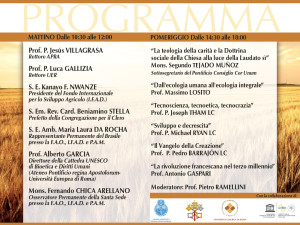“Agricultural development and the fight against hunger. The call of Pope Francis’ encyclical Laudato si’.”
November 26, 2015 at the Pontifical University Regina Apostolorum and the European University of Rome.
The meeting is sponsored by the Permanent Observer Mission of the Holy See to the United Nations together with the Pontifical Athenaeum Regina Apostolorum and the European University of Rome and in collaboration with the UNESCO Chair in Bioethics and Human Rights.
On 26 November 2015 the international conference “Agricultural development and the fight against hunger. The call of Pope Francis’ encyclical Laudato si’“ will be held at the Pontifical Athenaeum Regina Apostolorum and the European University of Rome. The meeting is sponsored by the Permanent Observer Mission of the Holy See to the United Nations together with the Pontifical Athenaeum Regina Apostolorum and the European University of Rome and in collaboration with the UNESCO Chair in Bioethics and Human Rights. The goal is to raise awareness and deepen the thought of Pope Francis’ recent encyclical Laudato si’ and his call for a conversion to an integral ecology for a solicitus care of the natural and social environment in which we live.

“I’m quite happy with this initiative,” said Father Jesus Villagrasa LC, Rector of Regina Apostolorum “for two reasons: first, because the morning meeting touches the main concern that I believe it was in the heart of the Pope when he wrote the encyclical. He himself, in the recent interview in Paris Match, said that he had started the encyclical Laudato si’ in the words of the Cantico delle creature, because he wanted to show the profound links that exist between the commitment to eradicate poverty and care for creation. Second, because in the afternoon session there will be university professors to deepen the doctrinal richness of the Encyclical.”
The Rector of the European University of Rome, Father Luke Gallizia LC, said: “The theme of the conference is of particular importance to the cultural moment that we are living and also for the mission of a university. Pope Francis has explored deeply, in the encyclical letter Laudato si’ the technocratic paradigm that dominates our post-modern culture. While recognizing the value of scientific research and the benefits that the recent discoveries, especially in the last two centuries, have contributed to the solution of many of humanity’s problems, the Holy Father underlines the risk that this enormous power should turn against man, if it is not accompanied by the development of the human being with regard to his responsibility, values and conscience.”
What happens in our “common home” is even more alarming. We face an environmental crisis without precedent. The cry of the people suffering hunger in the world is today, more than ever, an ethical and political imperative. It important that the new generation finds its vocation in a real ecological citizenship. At the same time, we seek a more effective international cooperation to encounter the poorest people and those in grave difficulty.
Laudato si’ is a document that flows from the fertile river that is the patrimony of the Church’s social doctrine. Nevertheless, there are many scientific, technological, philosophical, theological, and social challenges the we must still face from the perspective of integral humanism and solidarity, so that Catholics, but not only Catholics, can carry on a social ministry more that is more effective, open to all and with the participation of all. We must build bridges and be a leaven in society so that we can make a responsible and effective contribution to society. We need a commitment that comes from a mind and a heart of solidarity, focused on the excellent way of love and charity towards others, especially towards the most vulnerable in our society.
The Permanent Observer Mission of the Holy See to the United Nations is committed to creative and proactive dialogue in the international community. Evidence of this is its contribution in organizing this conference, in which the university intends to offer information and inspiration to people of good will who are working for the common good. In this regard, it is important to remember that care for our common home is task for all. The environment is the heritage of humanity. To fight against hunger, we first need to defeat egoism, atrocious individualism that locks us in ourselves, that creates self-centeredness and separates us away from the other, shattering fraternity and creating rivalry.
On the theme of the meeting, Prof. Alberto García, director of the UNESCO Chair in Bioethics and Human Rights, said: “Our globalized world needs men and women with competence and virtue able to assume the commitment of caring for our common home. Creative people are able to find convergence in the ideas, talent and resources that point towards the common good. With dedication, optimism and mutual respect for each other, now is the time of transcendence out of ourselves, to look to the other. Today is the time to make a commitment of solidarity in favor of others, not of nostalgia and sterile complaints.”
For information about the conference you can visit:
www.uprait.org
Michela Coluzzi
Head of Press and Institutional Communication of the Pontifical Regina Apostolorum
E-mail: mcoluzzi@upra.org – 3929009683
Carlo Climati
Press Office of the European University of Rome
E-mail: carlo.climati@unier.it – 06 665 431.

